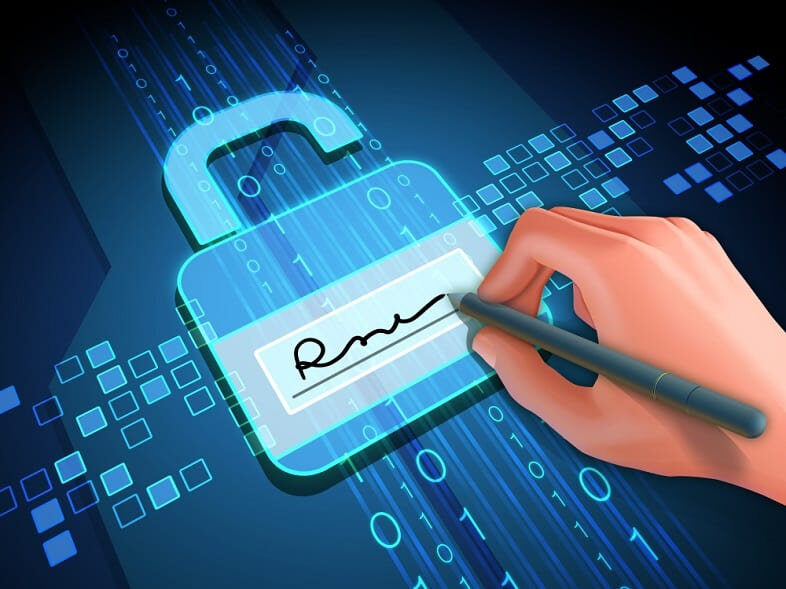By Timothy Wiseman
Electronic signatures can be substantially more convenient than signing a physical document. Generally, the law will treat an electronic signature as an equivalent to a physical signature, but there are some nuances.
What is an electronic signature?
Generally, the phrase “electronic signature” is used broadly. Nevada Law, defines electronic signatures, at least for purposes of transactions, at NRS 719.100 by saying ““Electronic signature” means an electronic sound, symbol or process attached to or logically associated with a record and executed or adopted by a person with the intent to sign the record.” Federal law, in the ESIGN act provides a very similar definition at 15 USC 7006 “The term “electronic signature” means an electronic sound, symbol, or process, attached to or logically associated with a contract or other record and executed or adopted by a person with the intent to sign the record.”
As the definitions imply, there are numerous forms of electronic signatures. Typographic and cryptographic electronic signatures see frequent use in practice. Typographic signatures use an “/s/” to indicate that the document has been signed. For instance:
/s/ Timothy A. Wiseman
TIMOTHY A. WISEMAN
Cryptographic signatures are more complicated and use sophisticated mathematics to create digital signatures which are difficult to forge and can show if the document was changed after it was signed. Cryptographic signatures are sometimes referred to as digital signatures, though that can easily be confused with the more broadly defined electronic signature. They support authenticity, data integrity, and non-repudiation of the signed document. There are several software solutions to support digital signatures, but most are based on the Digital Signature Algorithm published by NIST. Despite their other advantages, cryptographic signatures can be more complicated to use than typographic signatures and assume that both sender and recipient are using compatible software.
When is an electronic signature valid?
There are some nuances to determining when the law will fully accept an electronic signature, and when in doubt it is wise to consult a competent attorney about the details of the situation. With that caveat, the law will treat an electronic signature as equivalent to a standard ink signature in most cases. In particular, electronic signatures may be used for contracts so long as all parties agree. NRS 719.220-240.
In Nevada, electronic signatures for transaction purposes of transactions are governed by Chapter 719 of the Nevada Revised Statutes, which is Nevada’s codification of the Uniform Electronic Transactions Act. It states, in part:
NRS 719.240 Legal recognition of electronic records, electronic signatures and electronic contracts.
1. A record or signature may not be denied legal effect or enforceability solely because it is in electronic form.
2. A contract may not be denied legal effect or enforceability solely because an electronic record was used in its formation.
3. If a law requires a record to be in writing, an electronic record satisfies the law.
4. If a law requires a signature, an electronic signature satisfies the law.
Federal law includes similar provisions in the Electronic Records and Signatures in Commerce Act (ESIGN).
Courts have particularly adopted the use of typographic signatures. Nevada’s Eighth Judicial District Courts, which covers Clark County specifically treats typographical signatures as personal signatures, unless the document must be signed under penalty of perjury, witnessed by a notary, or signed by an opposing party, in which case it must be physically signed and then scanned. EDCR 8.07 (b)-(d). The Las Vegas Justice Court has followed suit more recently and adopted essentially the same rules. LVJC Admin. Ord. 15-06. In fact, the Las Vegas Justice Court FAQ encourages using a typographic signature on most documents that will be e-filed.
In addition to the requirements for standard ink signatures for certain papers to filed in court noted above, there are a few other areas of the law that either disallow electronic signatures or have additional requirements for their use. Nevada law does allow for the use of electronic wills, but the required process is detailed and more complicated than standard usage of an electronic signature. NRS 133.085. Similarly, electronic signatures are allowed for purpose of health care records and directives, but additional requirements for the transmission and storage of those records apply. NRS 439.592. While electronic signatures are acceptable in most situations, it is best to consult an attorney when there are questions.





